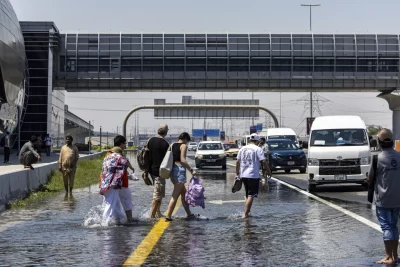
The latest calculations from several science agencies showing Earth obliterated global heat records last year may seem scary. But scientists worry that what’s behind those numbers could be even worse.
The Associated Press asked more than three dozen scientists in interviews and emails what the smashed records mean. Most said they fear acceleration of climate change that is already right at the edge of the 1.5 degrees Celsius (2.7 Fahrenheit) increase since pre-industrial times that nations had hoped to stay within.
“The heat over the last calendar year was a dramatic message from Mother Nature,” said University of Arizona climate scientist Katharine Jacobs. Scientists say warming air and water is making deadly and costly heat waves, floods, droughts, storms and wildfires more intense and more likely.
Average global temperatures broke the previous record by a little more than a quarter of a degree (0.15 degrees Celsius), a big margin, according to calculations Friday from two top American science agencies, the British meteorological service and a private group founded by a climate skeptic.
Nearly every scientist who responded to AP’s questions blamed greenhouse gases from the burning of fossil fuels as the overwhelmingly largest reason the world hit temperatures that human civilization has not likely seen before. El Nino, which is bordering on “very strong,” is the second-biggest factor, with other conditions far behind, they said.
The trouble with 2023, NASA’s Schmidt said, is “it was a very strange year … The more you dig into it, the less clear it seems.”
One part of that is the timing for when 2023’s big burst of heat began, according to Schmidt and Samantha Burgess, deputy director of Europe’s Copernicus Climate Service, which earlier this week put warming at 1.48 degrees Celsius above pre-industrial times.
Temperatures are typically highest above normal in late winter and spring, they said. But 2023’s highest heat kicked in around June and lingered at record levels for months.
Former NASA climate scientist James Hansen, often considered the godfather of global warming science, theorized last year that warming was accelerating. While many of the scientists contacted by AP said they suspect it is happening, others were adamant that evidence so far supports only a steady and long-predicted increase.
“There is some evidence that the rate of warming over the past decade or so is slightly faster than the decade or so previous — which meets the mathematical definition of acceleration,” said UCLA climate scientist Daniel Swain. “However, this too is largely in line with predictions” that warming would accelerate at a certain point, especially when particle pollution in the air decreases.







